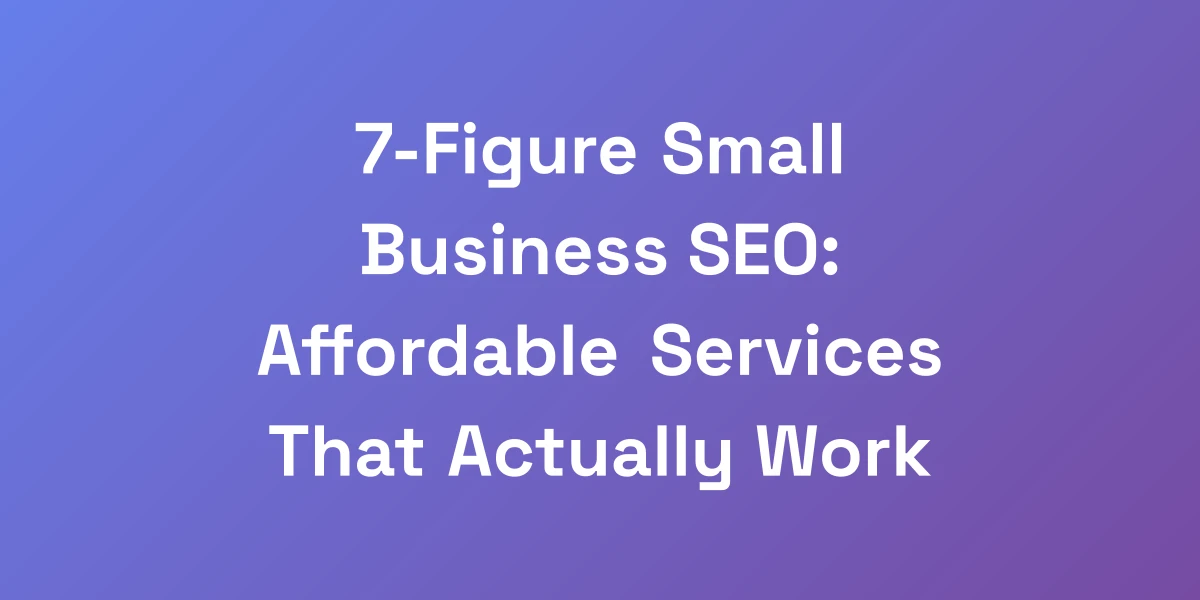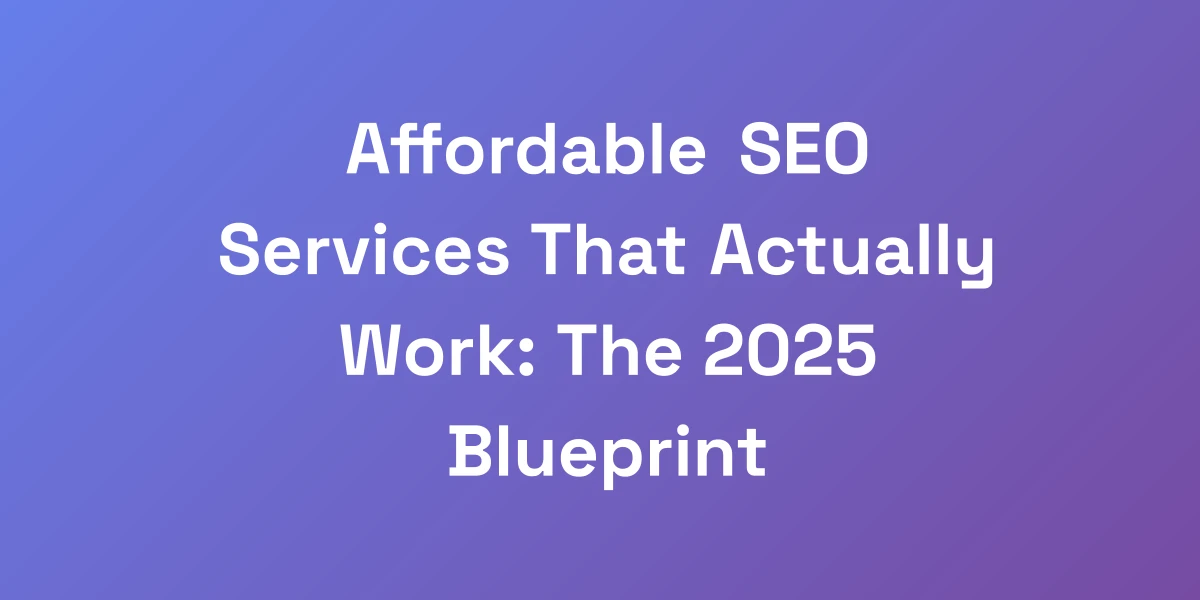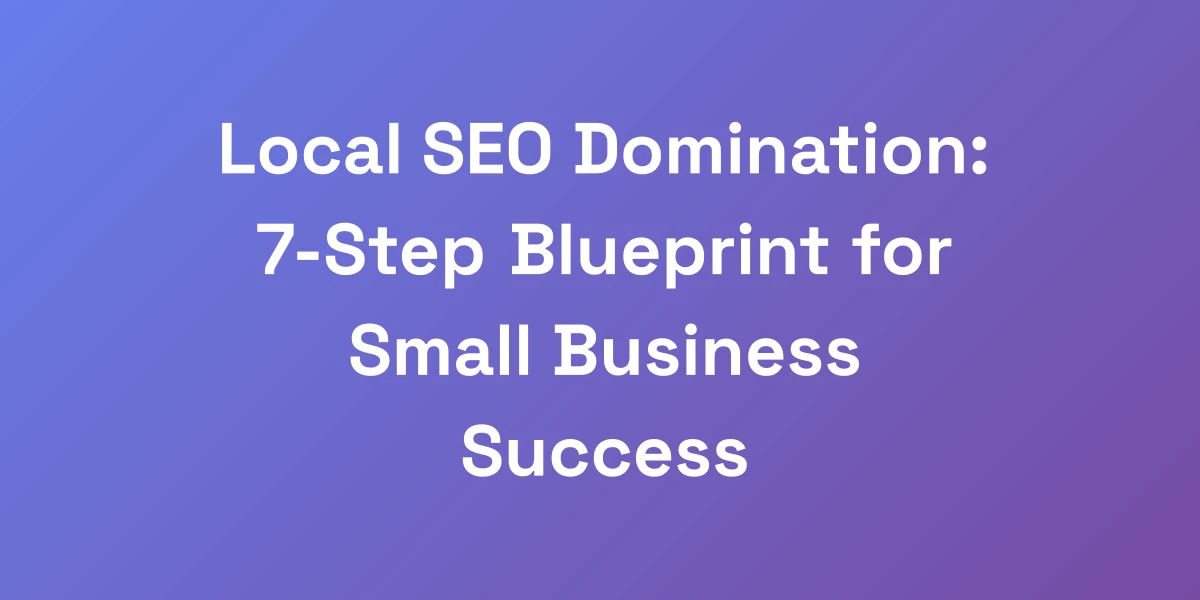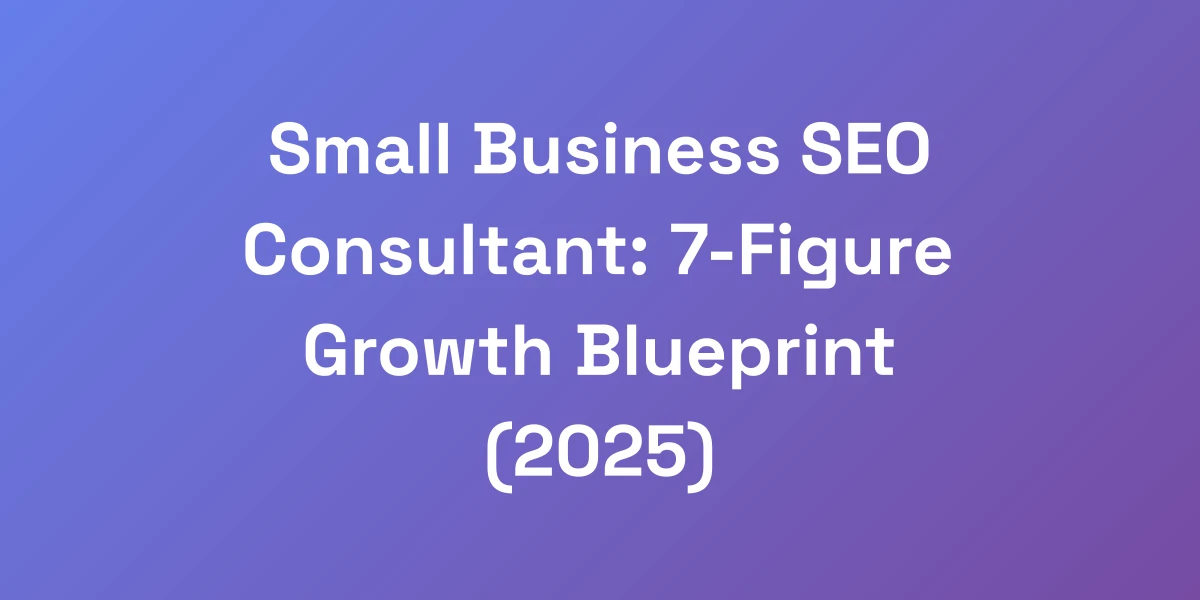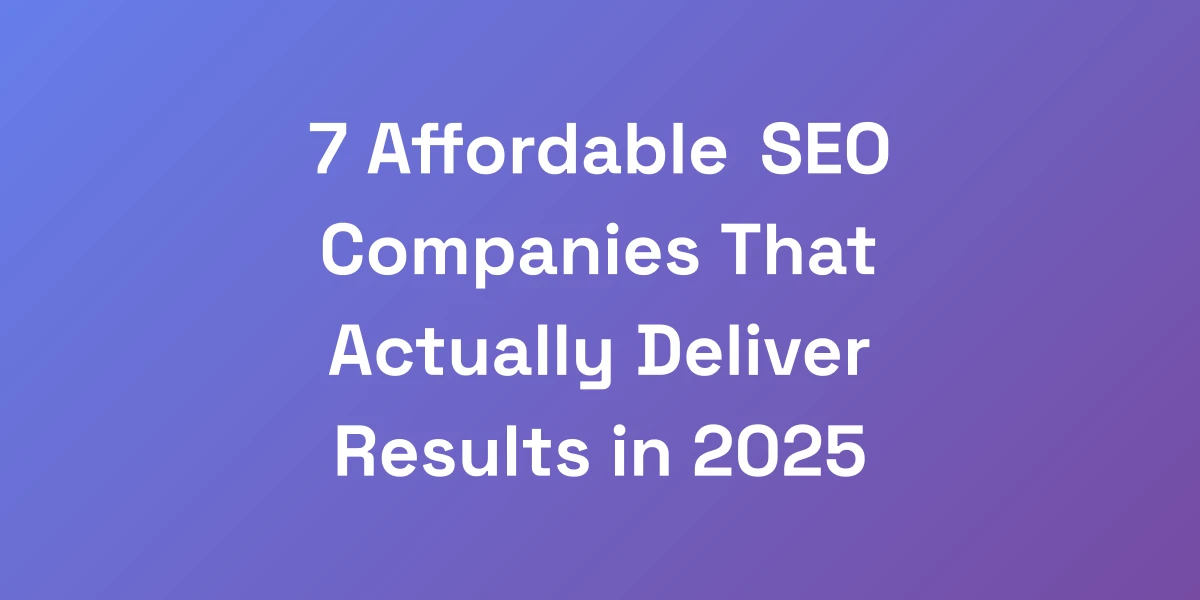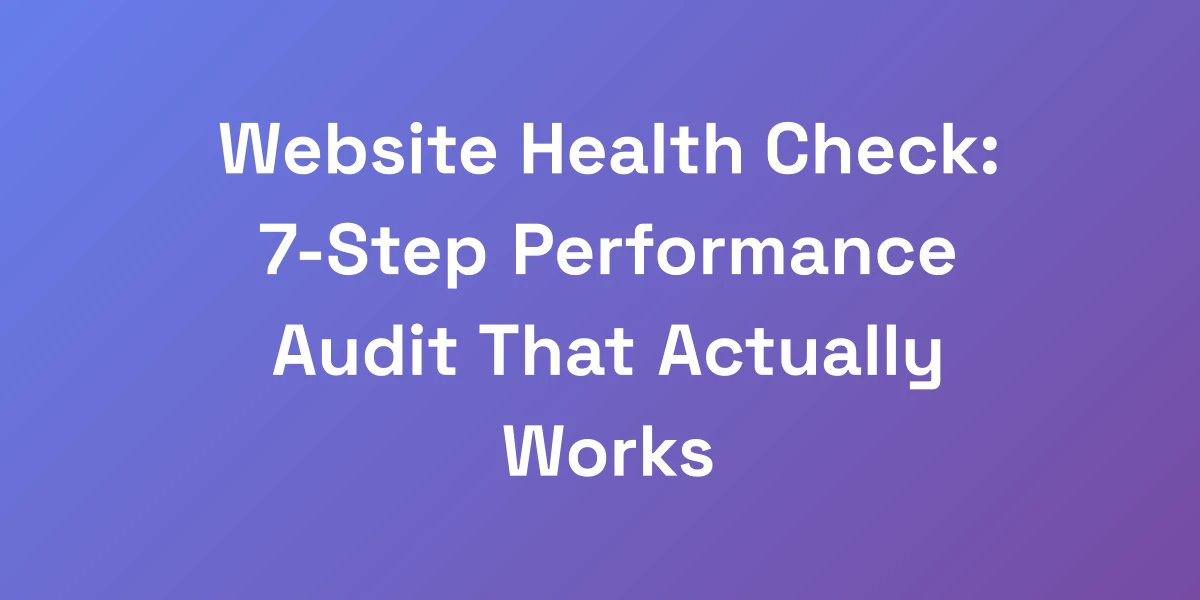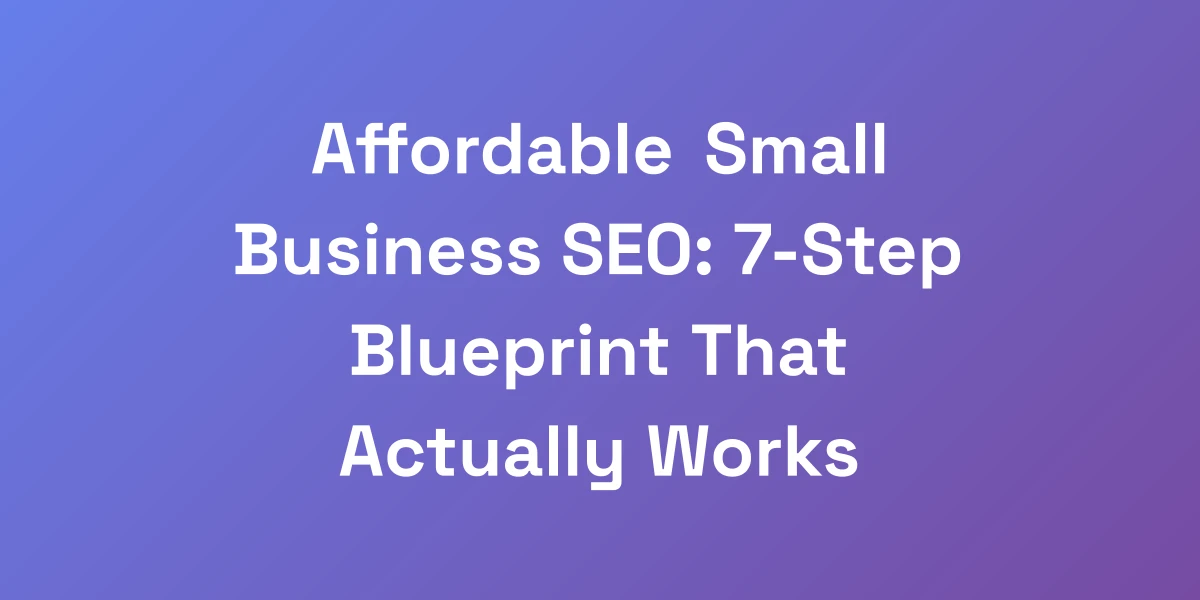
Affordable Small Business SEO: 7-Step Blueprint That Actually Works
Mar 15, 2025 | By zishansami102@gmail.com
We get it. Running a small business is tough. You’re juggling countless tasks, from managing inventory to handling customer service, all while trying to grow your online presence. SEO can seem like a daunting beast, especially when you’re on a tight budget.
But what if we told you that skyrocketing your visibility online doesn’t have to drain your finances? Imagine tapping into a powerful, affordable SEO strategy that drives real results without breaking the bank.
This isn’t just another fluff-filled guide. We’re diving deep into the nitty-gritty of affordable small business SEO. You’ll discover a no-nonsense, 7-step blueprint that works. Ready to transform your SEO game and watch your business thrive? Let’s get into it.
Why Most Small Businesses Waste Money on SEO (And How to Fix It)
Let’s be real: 90% of small businesses are bleeding money on SEO because they’re stuck in a game they don’t understand.
You’ve probably seen entrepreneurs throw thousands at “affordable” SEO services, only to get zilch in return. It’s frustrating, right? Here’s the brutal truth: you don’t need expensive agencies or complicated strategies.
What you need is a systematic approach that leverages your limited resources for maximum impact. In this section, we’ll uncover why most small businesses are wasting their SEO dollars and how you can turn the tide.
The Hidden Costs of Cheap SEO Services
When you go for the cheapest SEO services, you often think you’re saving money. But what you’re not seeing are the hidden costs.
- Low-Quality Backlinks: Cheap services often rely on spammy backlinks that can hurt your site’s credibility.
- Poor Content: Subpar content fails to engage visitors and doesn’t rank well.
- Lack of Customization: One-size-fits-all strategies don’t address your unique business needs.
Imagine pouring money into a system that promises results but fails to deliver. It’s not just about the dollars lost; it’s about the time you waste waiting for SEO strategies that never work.
Why Traditional SEO Advice Fails Small Businesses
Traditional SEO advice is often outdated or irrelevant for small businesses. Here’s why:
- Overemphasis on Keywords: Focusing solely on keywords ignores user intent and content quality.
- Ignoring Local SEO: Many small businesses benefit more from local searches than broad, generic ones.
- Complex Strategies: Overly technical strategies can be overwhelming and hard to implement without expertise.
Are you tired of hearing the same old SEO tips that don’t translate into actual results? It’s time to cut through the noise and focus on what truly matters.
The New ROI-Focused Approach to SEO
What if you could measure your SEO efforts in terms of just dollars and cents? That’s the essence of an ROI-focused approach.
- Track Conversions: Focus on actions that lead to sales or leads, not just traffic.
- Cost Per Acquisition: Understand how much each new customer costs you.
- Return on Content: Measure the revenue generated from each piece of content you create.
This approach shifts the focus from vague metrics to concrete, actionable data that directly impacts your bottom line.
Understanding the Real Value of SEO Investment
SEO isn’t an expense; it’s an investment. But how do you quantify its real value?
- Long-Term Growth: Unlike paid ads, SEO builds equity over time.
- Brand Credibility: High search rankings enhance your business’s trustworthiness.
- Sustainable Traffic: Organic traffic is more stable and cost-effective in the long run.
When you view SEO as an investment rather than a cost, you start to see the true potential it holds for your business growth.
The Essential DIY SEO Toolkit Under $200/Month
Stop thinking you need to spend thousands on SEO tools. We’re about to build a lean, mean SEO machine with just a few carefully selected tools that give you 80% of the results for 20% of the cost.
This isn’t about cutting corners – it’s about being strategic with your resources. We’ve personally tested dozens of tools, and these are the ones that consistently deliver the highest ROI for small businesses.
Core SEO Tools Every Business Needs
Let’s start with the essentials. These tools form the backbone of your SEO strategy:
- Google Analytics: Free and powerful, it tracks your website traffic and user behavior.
- Google Search Console: Monitors your site’s presence in Google search results.
- Yoast SEO: A WordPress plugin that optimizes your content for search engines.
These tools provide the foundational data you need to make informed SEO decisions. For more advanced options, explore various AI SEO tools that can further enhance your strategy.
Free Alternatives to Premium SEO Software
You don’t have to empty your wallet for effective SEO. Here are some top-notch free trial SEO tools:
- Ubersuggest: Offers keyword research and competitive analysis without the premium price tag.
- Bing Webmaster Tools: Provides site audits and backlink tracking for free.
- Ahrefs Backlink Checker: Allows you to monitor your backlinks without a costly subscription.
These free tools can handle most of your SEO needs if you use them wisely.
How to Maximize Tool Usage for Better ROI
Having the right tools is one thing; using them effectively is another. Here’s how to get the most out of your SEO toolkit:
- Regular Audits: Use tools like Google Search Console to perform monthly site audits and fix issues promptly.
- Keyword Tracking: Consistently monitor your keyword rankings with Ubersuggest to adjust strategies as needed.
- Content Optimization: Leverage Yoast SEO to ensure every piece of content is fully optimized before publishing.
Maximizing the potential of each tool significantly boosts your SEO performance without additional costs.
Setting Up Your SEO Dashboard
A centralized SEO dashboard keeps all your critical metrics in one place. Here’s how to set it up:
- Google Analytics Integration: Combine it with Google Search Console to track traffic and search performance.
- Ubersuggest Widgets: Add keyword rankings and competitor analysis to your dashboard for quick insights.
- Custom Reports: Create tailored reports that focus on your specific SEO goals and KPIs.
With a well-organized dashboard, you can quickly assess your SEO health and make data-driven decisions. Consider integrating automated SEO reporting to streamline this process.
Automation Tools to Save Time and Money
Automation is key to scaling your SEO without scaling costs. Here are some automation tools that can help:
- Zapier: Automate tasks between your SEO tools and other apps, saving you hours each week.
- Buffer: Schedule your content posts across multiple platforms to maintain a consistent presence.
- IFTTT: Create simple automations for repetitive SEO tasks, like updating your Google My Business profile.
By automating routine tasks, you free up time to focus on more strategic SEO efforts that drive growth. Additionally, leveraging AI tools for SEO can further optimize your workflows.
Quick-Win SEO Tactics That Cost Nothing
Listen up: before you spend a single dollar on SEO, there are high-impact optimizations you can implement today that cost absolutely nothing.
These aren’t just “tips and tricks” – these are fundamental improvements that most businesses overlook.
Implement these basic optimizations correctly, and you could see your organic traffic soar.
Google Business Profile Optimization Secrets
Your Google Business Profile is a goldmine for local SEO. Here’s how to optimize it for maximum impact:
- Complete Your Profile: Ensure every section is filled out, including address, hours, and contact information.
- High-Quality Images: Upload professional photos that showcase your business and offerings.
- Regular Updates: Post updates about promotions, events, or new products to keep your profile active.
- Respond to Reviews: Engage with customers by responding to reviews, both positive and negative.
A well-optimized Google Business Profile can significantly boost your visibility in local searches and attract more customers.
On-Page SEO Fundamentals That Work
If you want your website to rank, mastering on-page SEO is non-negotiable. Here’s what you need to focus on:
- Title Tags: Craft compelling title tags that include your target keywords.
- Meta Descriptions: Write concise meta descriptions that summarize your content and encourage clicks.
- Header Tags: Use H1, H2, and H3 tags appropriately to structure your content.
- Internal Linking: Link to other relevant pages on your site to improve navigation and SEO.
These on-page elements are the building blocks of SEO and are crucial for ensuring your site is search-engine friendly.
Content Optimization Without Writers
Think you need a team of writers to create SEO-friendly content? Think again. Here’s how to optimize your content without hiring professionals:
- Use AI Tools: Tools like Ubersuggest’s Content Ideas can help you generate topics and keywords.
- User-Generated Content: Encourage customers to leave reviews, testimonials, and comments.
- Repurpose Existing Content: Turn blog posts into videos, infographics, or social media posts to reach a wider audience.
With a bit of creativity and the right tools, you can produce high-quality content that ranks without the hefty price tag. Additionally, consider using autoblogging tools to automate content creation processes effectively.
Technical SEO Fixes Anyone Can Do
Technical SEO might sound intimidating, but many fixes are straightforward and don’t require a tech degree.
- Improve Page Speed: Use free tools like Google PageSpeed Insights to identify and fix speed issues.
- Mobile Optimization: Ensure your site is mobile-friendly, as Google prioritizes mobile-first indexing.
- Fix Broken Links: Regularly check for and repair broken links using tools like Broken Link Checker.
Addressing these technical aspects can enhance your site’s performance and improve its rankings.
Local SEO Strategies for Immediate Impact
Local SEO is a game-changer for small businesses targeting nearby customers. Here’s how to get started:
- Local Keywords: Incorporate local keywords into your content and meta tags.
- Customer Reviews: Encourage satisfied customers to leave positive reviews on Google and other platforms.
- Local Citations: List your business in local directories like Yelp, Angie’s List, and local chambers of commerce.
By focusing on these local SEO strategies, you can attract customers from your immediate vicinity and increase your local market share.
Building a Budget-Friendly Content Strategy
Content doesn’t have to be expensive to be effective. The key is understanding how to create high-leverage content that serves multiple purposes and targets buyer intent.
We’re sharing our exact process for creating content that ranks and converts, without hiring expensive content teams or agencies. This is the same framework we’ve used to help businesses generate millions in revenue.
Content Planning on a Shoestring Budget
Planning content strategically can save you time and money. Here’s how to do it right:
- Identify Your Audience: Understand who your customers are and what they’re searching for.
- Keyword Research: Use free tools like Google Keyword Planner and Ubersuggest to find relevant keywords.
- Content Calendar: Create a content calendar to organize your topics and publishing schedule.
Effective planning sets the foundation for a successful content strategy, ensuring you produce relevant and timely content consistently.
Repurposing Strategies for Maximum Impact
Don’t waste time creating new content from scratch every time. Repurposing is a powerful strategy that maximizes your efforts.
- Transform Blog Posts into Videos: Convert detailed blog posts into engaging video content for platforms like YouTube.
- Create Infographics: Turn complex information into visually appealing infographics that are easy to share.
- Social Media Snippets: Extract key points from your content to create bite-sized social media posts.
Repurposing allows you to reach different audiences and extend the lifespan of your content without additional costs.
AI Tools for Content Creation
AI tools are revolutionizing content creation, making it easier and more affordable than ever.
- ChatGPT: Generate content ideas, outlines, and even full articles with AI assistance.
- Grammarly: Enhance your writing with AI-powered grammar and style suggestions.
- Canva: Create professional graphics and visuals quickly and easily.
Leveraging AI tools helps you produce high-quality content efficiently, freeing up time to focus on other aspects of your business.
User-Generated Content Tactics
Tap into the power of your audience by encouraging user-generated content. Here’s how:
- Customer Reviews: Ask customers to leave reviews on your Google Business Profile or website.
- Testimonials: Feature customer testimonials in your marketing materials.
- Social Media Challenges: Create challenges or contests that inspire users to share their experiences with your brand.
User-generated content not only builds trust but also provides fresh content for your SEO efforts without any additional cost.
Content Distribution Without Paid Ads
Promoting your content doesn’t have to involve a hefty advertising budget. Here’s how to distribute your content effectively:
- Social Media Sharing: Share your content on all your social media platforms to reach a broader audience.
- Email Newsletters: Send your latest content to your email subscribers to drive engagement.
- Guest Posting: Write guest posts for reputable blogs in your industry to gain exposure and backlinks.
By using these distribution channels, you can amplify your content’s reach and drive more traffic to your site without spending a dime on ads.
Measuring SEO Success Without Expensive Tools
Most businesses track the wrong metrics and make decisions based on incomplete data. We’ll show you how to set up a simple but powerful tracking system using free tools that actually measure what matters.
The goal isn’t to track everything – it’s to track the metrics that directly impact your bottom line. This is about measuring money, not vanity metrics.
With a well-organized dashboard, you can quickly assess your SEO health and make data-driven decisions. Consider integrating automated SEO reporting to streamline this process.
Essential SEO KPIs for Small Businesses
Focusing on the right Key Performance Indicators (KPIs) is crucial for measuring the effectiveness of your SEO efforts.
- Organic Traffic: The number of visitors coming to your site from search engines.
- Conversion Rate: The percentage of visitors who complete a desired action, such as making a purchase or filling out a form.
- Keyword Rankings: The positions of your target keywords in search engine results pages (SERPs).
- Backlinks: The number and quality of external links pointing to your website.
These KPIs provide a clear picture of your SEO performance and help you make informed decisions.
Setting Up Google Analytics 4 Properly
Google Analytics 4 (GA4) is a powerful tool, but it needs to be set up correctly to provide the insights you need.
- Create an Account: Sign up for GA4 and add your website as a property.
- Set Up Data Streams: Configure data streams for your website and any other digital platforms.
- Define Goals: Set up goals that align with your business objectives, such as form submissions or sales.
- Enable Enhanced Measurement: Automatically track key interactions like page views, scrolls, and outbound clicks.
A properly configured GA4 account ensures you’re capturing the right data to track your SEO success effectively.
Creating Custom ROI Reports
Standard reports might not give you the complete picture. Custom ROI reports focus on the metrics that matter most to your business.
- Revenue Attribution: Track the revenue generated from organic traffic sources.
- Cost Tracking: Monitor your SEO-related expenses to calculate your cost per acquisition.
- Performance Over Time: Analyze how your KPIs change over time to identify trends and areas for improvement.
Custom ROI reports provide a clear understanding of how your SEO investments are paying off, allowing you to optimize your strategies accordingly.
Tracking Competitor Performance
Keeping an eye on your competitors can provide valuable insights into their SEO strategies and help you stay ahead.
- Analyze Their Keywords: Use tools like Ubersuggest to see what keywords your competitors are ranking for.
- Backlink Analysis: Identify where your competitors are getting their backlinks and seek similar opportunities.
- Content Strategy: Examine the type and quality of content your competitors are producing.
Understanding your competitors’ strategies helps you refine your own and uncover new opportunities for growth.
Monthly SEO Audit Checklist
Regular audits ensure your SEO efforts stay on track and continue to deliver results. Here’s a simple monthly checklist:
- Check for Broken Links: Use tools to identify and fix any broken links on your site.
- Review Keyword Rankings: Monitor the positions of your target keywords and adjust strategies if needed.
- Analyze Traffic Sources: Understand where your organic traffic is coming from and focus on high-performing channels.
- Update Old Content: Refresh outdated content to keep it relevant and improve its performance.
- Monitor Backlinks: Keep track of new backlinks and disavow any spammy ones.
A monthly audit helps you stay proactive, ensuring your SEO strategy remains effective and aligned with your business goals.
Scaling Your SEO Without Scaling Costs
Here’s where most businesses get it wrong: they think scaling SEO means spending more money. We’re here to show you how to leverage systems and automation to grow your SEO results exponentially while keeping costs linear.
This is about working smarter, not harder, and using the compound effect to your advantage.
Automation Strategies for Growth
Automation can significantly enhance your SEO efforts without adding to your workload. Here’s how:
- Automate Reporting: Use Google Analytics and Ubersuggest to generate regular reports automatically.
- Content Scheduling: Schedule your blog posts and social media updates in advance using tools like Buffer.
- Email Automation: Set up automated email campaigns to nurture leads generated through SEO.
By automating repetitive tasks, you free up time to focus on more strategic initiatives that drive growth.
Building SEO SOPs
Standard Operating Procedures (SOPs) ensure consistency and efficiency in your SEO tasks. Here’s how to build effective SOPs:
- Document Processes: Clearly outline each step of your SEO processes, from keyword research to content publishing.
- Assign Responsibilities: Define who is responsible for each task to avoid confusion and ensure accountability.
- Use Checklists: Create checklists for recurring tasks to ensure nothing is overlooked.
Having well-defined SOPs allows you to scale your SEO efforts without continually reinventing the wheel.
Training Internal Teams
Empower your team by training them in SEO best practices. Here’s how:
- SEO Workshops: Conduct regular training sessions to keep your team updated on the latest SEO trends and techniques.
- Online Courses: Provide access to online SEO courses and resources for continuous learning.
- Encourage Collaboration: Foster a collaborative environment where team members share insights and strategies.
Training your internal team builds a knowledgeable workforce that can effectively implement and scale your SEO strategy.
When to Outsource vs DIY
Deciding whether to outsource certain SEO tasks depends on your business needs and resources. Here’s a simple guide:
- Outsource When: You lack the time or expertise for specialized tasks like advanced technical SEO or comprehensive backlink building.
- DIY When: Routine tasks like on-page optimization and basic content creation can be handled internally.
- Hybrid Approach: Combine internal efforts with outsourced expertise for a balanced strategy.
Knowing when to outsource helps you optimize your resources and maintain control over your SEO strategy. For a deeper dive into DIY SEO vs professional SEO, check out this comprehensive analysis.
Future-Proofing Your SEO Strategy
SEO is constantly evolving, and staying ahead requires forward-thinking strategies. Here’s how to future-proof your SEO:
- Stay Updated: Regularly follow SEO news and updates to adapt to changes in search algorithms.
- Focus on Quality: Prioritize high-quality, user-focused content that meets evolving search intent.
- Embrace New Technologies: Leverage emerging technologies like AI and voice search to stay competitive.
By anticipating changes and adapting your strategies, you ensure your SEO efforts remain effective in the long run.
Conclusion
We’ve walked through a comprehensive, 7-step blueprint for affordable small business SEO that truly works. From avoiding common SEO pitfalls to leveraging budget-friendly tools and strategies, you now have the tools to transform your online presence without draining your resources.
Remember, SEO isn’t about spending more – it’s about spending smarter. By implementing these actionable tips and maintaining a strategic approach, you can achieve significant growth and sustainable success.
Ready to take your SEO to the next level? Start applying these steps today and watch your business thrive.
Have questions or additional tips to share? Drop them in the comments below and let’s continue the conversation. We’re all in this together, and your success is just a step away.
